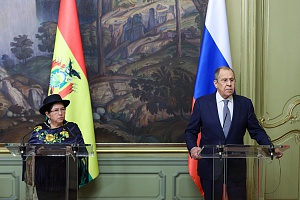Foreign Minister Sergey Lavrov’s remarks and answers to media questions during a joint news conference following talks with Minister of Foreign Affairs of the Plurinational State of Bolivia Celinda Sosa Lunda, Moscow, April 26, 2024
Ladies and gentlemen,
Today, we have held good talks with Minister of Foreign Affairs of the Plurinational State of Bolivia Celinda Sosa Lunda. Ms Minister and I became personally acquainted not so long ago: we were attending events as part of the G20 Ministerial Council Meeting in
We have taken stock of our bilateral cooperation and mapped further steps. We have noted positive dynamics in various sectors, singling out issues that require more focus.
We maintain intense contacts at the high and highest levels. Ties have become more active between our parliaments, as well as between various ministries and agencies. We are interested in strengthening our partnership and taking it to a qualitatively new level. We have agreed to speed up the work on a number of intergovernmental documents in different areas.
We have a shared interest in stepping up and diversifying bilateral trade and in implementing promising investment projects. We have adopted a decision to use more actively the potential of the Russian-Bolivian Intergovernmental Commission on Trade and Economic Cooperation.
In energy, there is much potential for expanding joint activities. Gazprom and
Today, we covered extensively the kind of additional steps we need to take in order to identify a solution that meets the interests of our countries and reflects the balance of interests with account taken of the initiatives put forward by the Bolivian side in energy and agricultural supplies.
We noted the solid pace of our efforts to expand educational exchanges. We have increased the number of scholarships provided annually to
Notably, this year,
We discussed regional and global priorities.
We share the opinion that, as multi-ethnic countries with diverse cultures and traditions, we can do a lot to strengthen peace and stability around the world and promote inter-civilisational dialogue and accord.
We support
We are in favour of a speedy resolution of the problems plaguing the region, including a long-standing need to immediately lift the unlawful trade, economic and financial embargo against
We touched upon cooperation between our countries within the UN. We are grateful to Bolivia for its consistent support of our initiatives, its co-sponsorship of most of the draft resolutions submitted by Russia, as well as for its balanced and principled position on what brought on the situation around Ukraine and the efforts that the Russian Federation has been undertaking in this regard, as it seeks justice to ensure security interests and rights of people living in the common space.
The talks were productive. Comrade Minister will meet with officials from other agencies, including Rosatom and the Ministry of Economic Development.
We are confident that this visit will give a boost to the bilateral agenda, and we will have every reason to report on this to our respective presidents.
Question (retranslated from Spanish):
Sergey Lavrov: We discussed this issue. Comrade Minister reaffirmed
The work of BRICS is based on consensus. Recently it completed regular sherpa and sous-sherpa meetings. In early June,
Question (addressed to Sosa Lunda): This is a question about bilateral cooperation. At the end of March, the Rosatom State Corporation announced that it did not rule out a possibility of building a lithium energy storage plant in
I also have a question on security. What do you think about Argentina has been amassing troops -up on its border with Bolivia and about a statement by Argentine President Javier Milei about his country’s desire to be a NATO global partner? How can this affect the situation in the region in general and in
Sergey Lavrov (adding after Sosa Lunda): We understand our Bolivian friends’ sentiment towards the North Atlantic alliance very well, as much as the overwhelming majority of the Global South and Global East nations. We know from our own experience what this aggressive bloc is all about (it was called “aggressive” in the past and I can’t find a better definition for it today, either).
The NATO-Russia Council was established after the advent of what everyone thought to be universal well-being. Insurmountable ideological contradictions perished, and everyone began to proclaim universal human values and common economic and security spaces. Our partners swore that the alliance wouldn’t expand. When it started expanding, they promised that it wouldn’t permanently deploy combat forces and armed units on the new territories. Their numerous promises turned out to be false. NATO officials are trying to prove that their alliance is designed to defend exclusively the territories of its member-countries. This is yet another lie.
At the same time, NATO Secretary General Jens Stoltenberg announced that they are committed to the treaty that binds them to defend their common space but right now, they could not deal with this because they ought to gain access to the Indo-Pacific Region first. They are already creating bloc structures there, which reproduce NATO thinking and mentality. They want to build the bloc’s infrastructure there. A NATO-Japan agreement has been already announced.
Now the Asia-Pacific Region is no longer enough for them – they want to go to
Question: Is there a plan to step up cooperation between
Sergey Lavrov: We have sustainable relations and several areas of cooperation with ALBA that was established at
In its sub-region, ALBA is promoting CELAC’s principles and values that we support. I would also like to note active and useful political dialogue as a practical area of cooperation.
Our states maintain close coordination at the UN and firm contacts on cultural and educational exchanges. The humanitarian component is playing a major role in our interaction.
A number of ALBA countries, including





